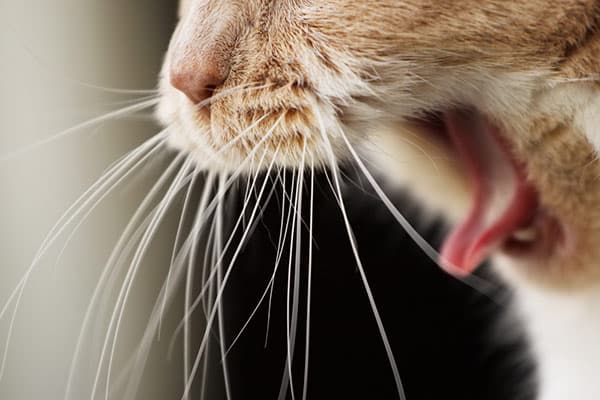You’re enjoying an afternoon reading on your sofa as your cat soaks up some rays on a sunny spot on the rug. When suddenly, there’s a cacophony from his direction usually accompanied by convulsions. The whole scenario can seem violent and dangerous initially but most of the time it’s fairly benign. It’s also a familiar noise that still brings cat parents running toward the sound like the very first time they heard it – your cat getting ready to vomit. That noise you hear is gagging – so yes, cats have a gag reflex. Let’s find out what creates cat gagging and what can you do about it.
Cat gagging
Cats are so well-adapted for survival that even their gag reflex is finely tuned. The gag reflex as per Merriam Webster: (noun) reflex contraction of the muscles of the throat caused especially by stimulation (as by touch) of the pharynx. The ability to quickly reject something they just ingested – especially something harmful that has entered their system– is all part of their evolutionary advantage. Occasionally, it’s normal for a healthy cat to gag. Usually it’s followed by vomiting but not always.
Gagging isn’t coughing (which has to do with the lungs) or sneezing (aka feline sternutation which has to do with the nasal passages) – although the sounds can seem similar across species. So, what is it exactly? Technically, they’re physical responses to different cranial nerve stimuli. A cat will gag when something touches his larynx. It is often followed by swallowing and neck extension, and a widening of his mouth. The entire episode is to eject something – either real or perceived (something tickled his throat!).
Gagging could be a pointer to danger
While gagging and vomiting are somewhat common occurrences, if it happens too frequently, it’s a cause for alarm. Richard Goldstein, DVM, and a professor at Cornell University’s College of Veterinary Medicine, warns on the university’s website that lots of cats vomit from time to time, but he doesn’t believe that cat parents should let it go more than once per week without a trip to the vet.
Many times, hairballs are the culprit for cat gagging. Hairballs form as cats groom themselves — the tried- -and-true tongue bath. By licking themselves, cats are removing dander and debris, and often, a lot of hair. Most of the hair they’ve ingested gets passed through the digestive system unnoticed. But there are times when the hair gets stuck in the stomach. This attracts more hair to it and a hairball forms. Remember cats are good at ejecting anything harmful – and gagging begins. The hairball is usually vomited out, an unsavory clump of mostly hair, bile and mucus.

Sometimes gagging can occur due to other potentially dangerous objects:
- String
- Fishing line
- Tinsel
- Anything toxic
- Bones
- Anything foreign
What to do in an emergency
“The most important thing to do when you see your cat gagging repeatedly is to check his airway,” says Dr. Will Spanbock of Good Ground Animal Hospital in Hampton Bays, New York. “Gently draw his tongue forward and check with a light to see anything foreign. If see something that looks long, like a string, do not pull it out – get your cat to the vet immediately!”
Whether or not you are able to identify anything, if your cat has been excessively gagging, a trip to the vet is required as soon as possible.
If your cat does a lot of gagging (followed by puking up those pesky hairballs), there are a few preventives and remedies available. Brushing and bathing your cat regularly is a good start. A healthy diet, plenty of fresh water and supplements are helpful. And, your cat will like this one – so is catnip!
The South Boston Animal Hospital recommends the following:
- Feed your cat oils and butters
- Give your cat hairball gel
- Give your cat anti-hairball treats (available at pet supply stores)
Since cats can’t talk to you and tell you what’s wrong, your cat gagging can be an indicator of something amiss with his health. Too frequently can be an issue – get him checked out if it persists.
Denise LeBeau is a writer, editor and photographer with almost 20 years of experience of creating content for animal-related issues, endeavors and events. She worked at Best Friends Animal Society for 12 years where she had two columns in the Best Friends Magazine, and held multiple content creation roles including web managing editor and outreach campaign editor. Denise has been an ongoing contributor to Catster since 2014, writing for the magazine and website. The self-professed poet laureate of the pet set is currently the manager of development for an animal welfare agency, where she works with a team to create content across media platforms. She lives in Hampton Bays with her two rescue Siamese mixes – Flipper and Slayer, and her LBD (little brown dog), Zephyrella.





